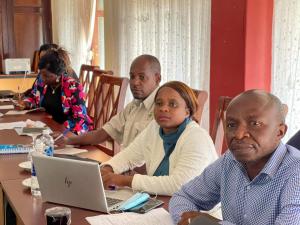Zimbabwe strengthens capacity to increase Tuberculosis Preventive Therapy coverage
By Tatenda Chimbwanda
Bulawayo, Zimbabwe – Tuberculosis (TB) Preventive Therapy (TPT) is a cost-effective way of reducing the risk of TB infection progressing to TB disease. TPT is a proven course of treatment that can prevent TB disease among those infected with TB and has been shown to reduce TB - related mortality among people living with HIV. TPT can lower the risk of TB disease in household contacts of persons with TB, people living with HIV and other high- risk groups whose immunity is compromised. In addition, TPT can help people living with HIV live longer and healthier lives. Zimbabwe has experienced a decrease in TPT coverage from 39% in 2020 to 17% in 2021. The decrease has been a result of missed opportunities in TB contact tracing which helps to identify individuals at risk of TB infection in the community, and quickly commence them on TPT. Several people at risk of TB have missed opportunities to receive TPT making it difficult to control TB.
As part of the Government of Zimbabwe’s efforts to strengthen TB contact tracing and improve TPT coverage, the Ministry of Health and Child Care (MoHCC) adopted the WHO guidelines, operational handbooks and Prevent TB application mobile app to support the uptake and scale up TPT services in Zimbabwe. MoHCC in collaboration with the World Health Organization conducted an external review meeting of programmatic management of TB Preventive Therapy (TPT) in Zimbabwe from 5-8 July 2022. Following the review, a report was produced, and Zimbabwe developed an action plan to further strengthen the roll out of TPT. Strengthening contact tracing was one of the key interventions revealed in increasing TPT coverage. Henceforth, MoHCC held a meeting in Mutare (25 – 29 July) 2022 on adapting the WHO Prevent TB Application. During this meeting MoHCC adopted the WHO Prevent TB Application to be useable in Zimbabwe.
“Treating those with TB successfully and preventing other people from developing TB remains the most important intervention in ending TB in Zimbabwe,” says MoHCC, National TB/HIV Officer Dr Manners Ncube.
The MoHCC with support from Jointed Hands Welfare Organization, The Union Zimbabwe Trust (UZT) and WHO recently conducted a WHO Prevent TB Application training for the pilot districts with a high prevalence of TB namely Gwanda and Isinza District (Matabeleland South Province) and Gweru District (Midlands Province) in Bulawayo from 28 November – 3 December 2022. During the workshop health workers from the 3 pilot districts were trained on using the WHO Prevent TB Application including developing the roll-out and monitoring plan.
“The WHO Prevent TB Application mobile app allows registration, screening, and referral of people targeted for TB screening or TB preventive treatment. Alerts help the providers to follow up people through the preventive care pathway,” noted WHO Zimbabwe HIV and TB Technical Officer Dr Mkhokheli Ngwenya.
Traditionally, TB contact tracing is done by Environmental Health Technicians (EHTs). With the introduction of the WHO Prevent TB Application and hybrid TB contact tracing will now include community nurses and village health workers. A great milestone for Zimbabwe as more people will be reached.
“The Prevent TB App is a game changer in our contact tracing. It will help us with contact tracing and increase TPT uptake. Moreover, the App will allow us to move away from the paper-based reporting system allowing efficient data analysis, provide us with real live data. Interventions will be more timeously as paper based reporting are done quarterly and it takes long for patients to be put on TPT,” added MoHCC, Senior Monitoring and Evaluation Officer, Mr Nicholas Siziba.
The Union Zimbabwe, Country Director Dr Ronald Ncube, highlighted how the implementation of the Hybrid TB contact tracing and WHO TB Application will drastically improve the link of TB patients to care and minimize the cases lost during contact tracing.
"As UZT we remain committed to support the 8 districts including the 3 pilot districts which have poor TB outcomes through contact tracing and linking them to care on time, says Dr Ronald Ncube.
Jointed Hands Welfare Organization Program Officer, Naome Nkiwane reaffirmed her organization’s commitment the continued support of the nine hundred (900) community health workers dotted around the country in the rolling out of the TB App after the pilot, continued support of the hybrid TB contact tracing.
Once successfully implemented in the pilot districts, lessons learnt will be used to accelerate the roll out of Hybrid TB contact tracing and Prevent TB Application throughout the country. This will enhance the scale up TPT coverage among TB contacts and people living with HIV/AIDS leading to the achievement of the set target of 80% reduction of TB incidence and mortality by 2025.




